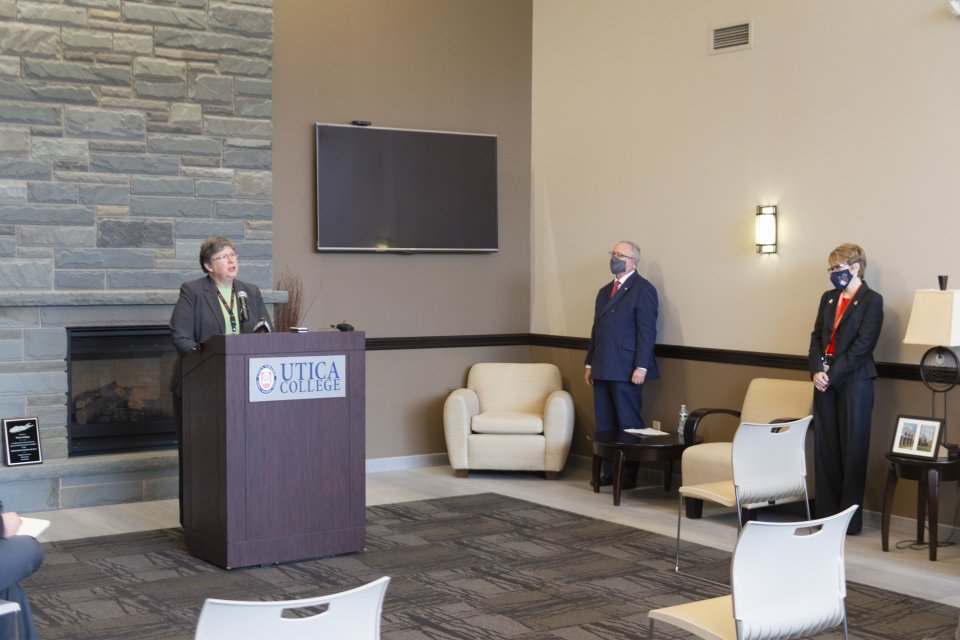Utica University Receives Largest Endowment Gift to Establish Institute for the Study of Integrative Healthcare

Patrice Hallock, founding director of the new Institute for the Study of Integrative Healthcare, speaks at a news conference announcing the institute. To the right: Utica College Provost Todd Pfannestiel and President Laura Casamento.
“This represents one of the largest charitable gifts in Utica’s history, and the largest single endowment gift since our founding.”
President Laura Casamento announced today that Utica University will establish an exciting new initiative, The Institute for the Study of Integrative Healthcare (ISIH), made possible through an anonymous multi-year gift commitment totaling $2.8 million.
“This represents one of the largest charitable gifts in Utica’s history, and the largest single endowment gift since our founding,” Casamento said.
The multi-disciplinary institute will promote advanced learning and research in the emerging field of integrative healthcare, which brings together a broad range of practices in support of patient health and well-being, Casamento said.
The donors, who have requested to remain anonymous, decided to make this philanthropic investment in Utica out of their firm belief that the college has a longstanding record of innovation and responsiveness to the changing landscape of the healthcare delivery system, Casamento said.
The Institute is a natural extension of the University’s mission and vision to pursue interdisciplinary study, particularly with respect to programs in the health professions, and improving patient care through applied research. The work of the Institute will provide many opportunities for students to collaborate and participate in professional research. In addition, the college will seek to establish strong partnerships with healthcare providers locally, regionally and nationally.
“What will be especially unique about the Institute, is the fact that of the roughly 50 similar institutes currently functioning nationwide, the Utica Institute will be one of only a handful that is anchored in a four-year professional institution with a liberal arts base,” said Utica University Provost Todd Pfannestiel. "The vast majority of these institutes are tied directly to medical schools; however, the Utica Institute will be uniquely positioned to explore integrative healthcare in an integrative educational model, which will include the traditional liberal arts, such as sociology and history among others, as well as business studies such as healthcare administration. Utica University is going to become a trailblazer with this model, made possible by the generosity and trust that the donors have placed in our college.”
The Institute will leverage technology to connect faculty, students, community members, practitioners, social service agencies and government to examine the relationship between integrative healthcare, patient health and professional practice. Students in physical therapy, occupational therapy, nursing, healthcare administration and sociology/anthropology will engage in meaningful experiences relating to their fields of study. Faculty associated with the Institute will take a transdisciplinary approach to their study to directly prepare students for their intended careers.
“Integrative healthcare acknowledges the varied strategies that individuals may choose to keep themselves healthy,” said Patrice Hallock, professor of education and founding director of the new institute. “It includes a broad range of strategies – some of which are evidence-based and some perhaps not – which could include natural, cultural and other traditional therapies that people use to keep themselves healthy. In short, it is treating the ‘whole’ patient.”
“We want to learn more about healthcare strategies that may be common to other cultures and traditions – like acupuncture – so that we can integrate them into our paradigm of what it means to be healthy,” Hallock said. It becomes particularly important, she said, in providing healthcare for immigrant and refugee populations.
Plans also include bi-annual national conferences, bringing together faculty, students, practitioners and evidence-based research principals.
Hallock, who currently serves as director, said that a national search for the Institute’s permanent director will begin later this fall.
The news comes just months after ground was broken for the Utica University Science Complex, a 25,000-square foot, $12-to-$14 million building to provide state-of-the-art classroom and lab facilities for majors such as biology, chemistry, geoscience and physics while also supporting health profession studies.
For more information, contact Hallock at phallock@utica.edu.



